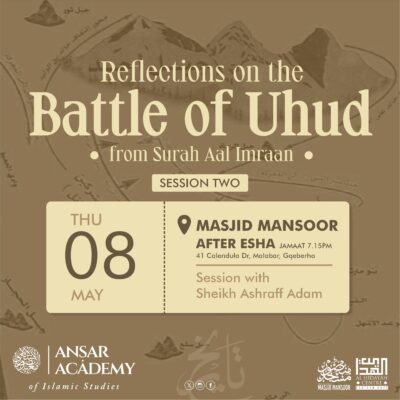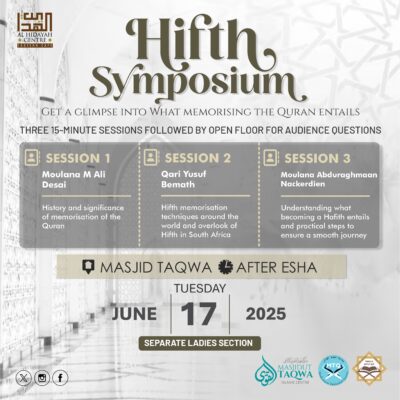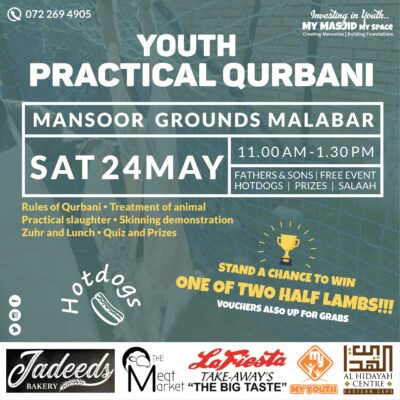Allah Ta’ala has designated certain pieces of earth as having more virtue than others. Of these, the most virtuous are Makkah Mukarramah and Madinah Munawwarah. Imam al Haskafi rahimahullah has stated that Makkah Mukarramah as a city is more virtuous than Madinah Munawwarah except for the land in which rests the blessed body of the Prophet sallallahu alaihi wa sallam. His noble grave is more virtuous than even the Ka’bah, and the Throne of Allah Ta’ala. Ibn Abideen rahimahullah agrees with this view. Qadi Iyadh rahimahullah adds that there is no difference of opinion that the blessed grave of the Prophet sallallahu alaihi wa sallam is the most virtuous piece of land on earth.
Makkah Mukarramah has several unique features. One Salaah in the Haram is better than 100,000 Salaahs in any other Masjid except for Masjid Nabawi in Madinah Munawwarah where it is 1,000 times better. Makkah Mukarramah is the only place on earth where Hajj and Umrah can take place. One is required to be in Ihram to enter the city. It contains the Ka’bah, the black stone, Rukn Yamani, and the Maqaam Ebrahim. It was designated as a Haram or sanctuary from the creation of the heavens and the earth.
- Madinah Munawwarah was chosen as the place of Hijrah (emigration) for the Prophet sallallahu alaihi wa sallam: “I was commanded to emigrate to a city which will conquer other cities. The people call it Yathrib, but it is now Madinah.” (Bukhari)
- It was designated as a sanctuary by him, as narrated in Bukhari, “The area between the two mountains of Madinah Munawwarah were made into a sanctuary by me.”
- “Belief will return to Madinah Munawwarah as a snake returns to its hole when in danger.” (Bukhari)
- “The terror caused by Dajjal will not enter Madinah Munawwarah.” (Bukhari) Angels will be guarding the gates of the city to prevent his entry.
- The Prophet sallallahu alaihi wa sallam remarked, “There is a garden from the gardens of Paradise between my house and my pulpit.” (Bukhari)
The hearts of Muslims the world over yearn to visit and stay in Madinah Munawwarah because it is the place where our beloved Prophet sallallahu alaihi wa sallam is buried. It is the city where he spent his last 10 years of his life, and it was the place chosen to launch the spread of Islam throughout the world. The city holds a special place in the hearts of Muslims as a result of the Dua of the Prophet sallallahu alaihi wa sallam, “Oh Allah, make Madinah beloved to us as You have made Makkah beloved to us, or even more than that.” (Bukhari)
The Prophet sallallahu alaihi wa sallam prayed for blessings in Madinah Munawwarah, “Oh Allah, grant us double the blessings in Madinah that You have given to Makkah.” (Bukhari) The Prophet sallallahu alaihi wa sallam would urge his mount to go faster when he would sight the walls of Madinah Munawwarah when returning from a journey out of love for Madinah Munawwarah. (Bukhari)
The pious people have written volumes on the love for Madinah Munawwarah. The magnetism and draw of the city is embedded within the heart of every Muslim.
- Umar radhiallahu anhu would pray, “Oh Allah, grant me martyrdom in Your path, and make my death occur in the city of Your Prophet sallallahu alaihi wa sallam.” His Dua materialised when he died through wounds sustained during Fajr prayer, and is buried next to the Prophet sallallahu alaihi wa sallam and Abu Bakr radhiallahu anhu in Madinah Munawwarah.
- Hakeem Akhtar rahimahullah exclaimed in his poetry, “My value is due to my attachment to Madinah Munawwarah, otherwise in reality we have no value.”
- Hazrat Ali radhiallahu anhu said, “I revere and respect the land in which you lived, Oh Prophet sallallahu alaihi wa sallam.”
- Hakeem Akhtar rahimahullah asks, “How would a person intoxicated with the world know the condition of a person enjoying the euphoria of Madinah Munawwarah?”
The history of the city goes back at least 3,000 years according to recorded history. It was originally named Yathrib most probably after the Amalekite king Yathrib Mahlael. In an inscription of the Babylonian king Nabonidus in Haran 550 BC it is named as a town in Arabia. The Geography of the Greek Ptolemy in 150 CE mentions it. Abraha, who tried to destroy the Ka’bah, ruled Yathrib for a short period and his inscription makes mention of the city.
The city of Yathrib had some unique features that made it the best place for the Hijrah and for Islam to spread across the world. Here is a look at seven of those features:
- Location.
It was situated close to the main caravan route connecting Roman lands with Yemen, with Makkah Mukarramah in between. It was not on the route itself making it a constant target for invaders, but it was close enough to be connected to mainstream civilisation. It was located around half a day’s journey away from the trade route.
- Underground water supply.
Yathrib is one of the few places in Central Arabia with underground streams and rivers. This is not a common feature in the Arabian Peninsula where water sources are hard to come by. As a result, there were many wells in the city. Being underground meant that the water sources could not be blocked off by besieging enemy forces.
- Agricultural economy.
Due to having regular water supplies, the city had greenery and was one of the few places in Central Arabia whose economy was based on agriculture. It boasted gardens and date palm plantations. This resulted in a settled lifestyle as compared to the majority of Central Arabia which lived a largely nomadic one. With this came civilisation, permanent buildings, built up infrastructure, and double storey dwellings. The society was thus more refined and cultured as compared to the Bedouin lifestyle.
- Multi religious society.
Yathrib had Jews and some Christians who co-existed with the Arabs for hundreds of years. It had a diversity of people, and this was an advantage for Islam which spread across cultural divides. The existence of well-educated Jews laid the foundation for the coming of the final Prophet sallallahu alaihi wa sallam which was heralded in their books, and which they conscientized the Arabs with as well. By hearing the Jews speak about it, the Arabs of the city were also in anticipation of the event. The idea of monotheism was also in the conscience of the Arabs in the city.
- The Jews.
The Jews probably settled in the city after the first destruction of Aqsa, when they were forced into exile. Most definitely from the second destruction they had moved to the city, and this was around 600 years before the Prophethood of Nabi Muhammad sallallahu alaihi wa sallam. They searched for places to settle, and the description of Madinah Munawwarah as the city foretold to be that of the final Prophet sallallahu alaihi wa sallam attracted them. In fact they ruled the city until the end of the 5th century CE. Among these Jews were the descendants of Prophet Haroon alaihis salaam, the Kohanim or Kohen who served as priests in the Temple at Aqsa. They had special honours in the synagogues. Their knowledge of the final Prophet sallallahu alaihi wa sallam was crucial.
- The Arabs.
The Aws and Khazraj Arab tribes who later became the Ansaar radhiallahu anhum were different from the rest of the Arab tribes in Central Arabia. They had migrated from Yemen, where they had a fabulous ancient civilisation. This was centred on the Maarib Dam which was built 2,000 years ago. It was a magnificent feat of engineering and was double the size of the Hoover Dam in America which required hundreds of thousands of workers and cost over 100 lives to build in the modern era. The kingdom in Yemen included Queen Bilqis of the time of Prophet Sulaiman alaihis salaam. They had a thriving civilisation which was destroyed because they became ungrateful to Allah Ta’ala. He caused the dam to burst which resulted in widespread flooding. 50,000 Arabs left for other places. Among the places they chose was Yathrib.
- The Wars of Buath.
The city of Yathrib underwent ongoing civil war between the inhabitants. The last of these lasted 120 years and culminated in the Wars of Buath around five years before the arrival of Prophet Muhammad sallallahu alaihi wa sallam. “The day of Buath was designed to help the Prophet sallallahu alaihi wa sallam. When he arrived in the city, the people were divided.” (Bukhari) Their chiefs had been killed. It was the perfect situation where a disillusioned generation were left leaderless and eager to embrace a faith that fostered brotherhood. The Prophet sallallahu alaihi wa sallam assumed the reigns of leadership in this political vacuum.
All these seven components came together to set the ideal circumstances for Yathrib to be the perfect place, at the perfect time to launch the most amazing spread of Islam across the world 1444 years ago when the Prophet sallallahu alaihi wa sallam entered the city. Location, water supplies, civilisation, agricultural economy, multi religious society, the presence of the Jews, Arab tribes not deeply connected to the rest of Central Arabia and the Wars of Buath contributed towards the perfect event.
The Plan of Allah Ta’ala is infinitely wise.
We glimpse a little of it as in this background and become amazed. We need to trust Allah Ta’ala’s decisions for us every step of our existence. Interconnected events that we might not even be aware of allow us to be where we are today. Everything happens with a purpose, there is no chaos. Even things that seem like difficulties are in reality goodness. “If you knew how Allah Ta’ala deals with your affairs for you, your heart will melt out of love for Him,” remarks Imam Shafi rahimahullah. Hazrat Ali radhiallahu anhu states that, “Many a blessing cannot be gained simply by thanking Allah Ta’ala, but is to be found in the dead centre of some calamity that you go through.”
We cannot comprehend the full magnitude of the amazing decisions of Allah Ta’ala. What we can do is make the correct choices to please Him and trust His Plan.








COMMENTS